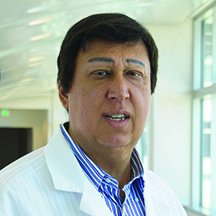

Precision Medicine Turns a Corner
by Zara Jethani
For many decades, cancers have been described—and even treated—according to the type of organ from which the cancer arises, such as lung, breast or brain. But increasingly doctors are looking at genetic information to determine how to best treat their patients and increase the chances for long-term survival. That concept has led to a new term in cancer care: precision medicine. Precision medicine means that doctors look at the biological processes that have gone awry and led to the growth of cancer in a specific person, such as gene mutations. Then they prescribe treatments that will target, or fix, that abnormal mechanism.

Santosh Kesari, MD, PhD, refers to precision medicine as “giving the right drugs to the right people at the right time for the right problem.” Precision medicine is here to stay, says Dr. Kesari, professor of neurosciences, chair of the department of translational neurosciences and neurotherapeutics at the Saint John’s Cancer Institute and director of neuro-oncology at Pacific Neuroscience Institute.
Earlier this year, the Food and Drug Administration released draft guidelines to oversee genetic testing for cancer treatment. The FDA’s draft is part of President Barack Obama’s Precision Medicine Initiative aimed at improving medical treatments by probing each individual’s genetic, biological, environmental and lifestyle information.
Genetic information is gleaned through gene sequencing technology, and precision medicine is only as good as the tests and the companies that perform the testing, Dr. Kesari says. “I’ve sent tumor samples to different testing companies, from the same patient, and we get different results. So there needs to be some guidance on this.”
The FDA guidelines are coming at a time when precision medicine is gaining great momentum, Dr. Kesari says. More genetic mutations linked to cancer are being discovered, and drug companies are producing new medications aimed at those mutations. These drugs are often referred to as “targeted therapy.”
In his practice, he routinely asks patients to undergo testing of the tumor to identify possible mutations. However, not every patient has access to precision medicine. “It is the standard now to offer precision medicine,” he says. “It shouldn’t be the exception anymore. I think more doctors are offering it, but in some practices they may not be doing it as much.”
Insurance companies are increasingly agreeing to pay for genetic sequencing of the tumors. But not every patient will have an identifiable mutation. Nor are there medications to treat each mutation. The use of precision medicine is more advanced for some types of cancers, such as breast cancer and lung cancer, than in other types, Dr. Kesari adds. “Even in diseases where it’s still quite difficult to do precision medicine, like brain tumors, we’re finding we can identify patients who will likely respond really well to certain treatments,” he says.

As more gene mutations are identified and drugs are developed, precision medicine will apply more often. Ongoing and retrospective brain tumor research and clinical studies give more insight into our knowledge and how it can be applied to developing effective therapies. Exciting research is even aimed at finding better ways to identify mutations. For example, Institute researcher Dave S.B. Hoon, PhD, is a pioneer in the field of “liquid biopsy,” which is a way to collect tiny bits of DNA that are shed from tumors and circulate in a patient’s blood. Having a blood test to identify mutations would offer many advantages over testing the actual tumor.
“In the last few years, there has been an explosion of blood-based tumor-DNA testing,” Dr. Kesari says. “We’re going to see progress with liquid biopsies.”
Adapted from the article WRITTEN BY SHARI ROAN from INNOVATIONS, FALL 2016.
About the Author

Zara Jethani
Zara is the marketing director at Pacific Neuroscience Institute. Her background is in molecular genetics research and healthcare marketing. In addition, she is a graphic designer with more than 20 years experience in the healthcare, education and entertainment industries.
Last updated: November 13th, 2019